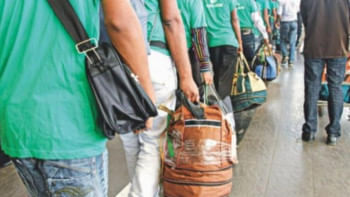Dhaka not for beginners!

Dhaka is not for beginners. This is a popular saying among Dhakaites, particularly the younger ones, who often make memes and write satires on this topic.
The megacity has a multitude of challenges that can overwhelm the unprepared.
Here, the air is so polluted that it can be life-threatening.
Even an hour-long rain can bring the capital to a standstill, with city roads remaining waterlogged for hours.
Besides, traffic congestion is a regular phenomenon in this city, adding to the chaotic public transport system.
Not to mention, the overburdened and expensive healthcare system and dengue woes leave many vulnerable.
On top of that, infrastructure, often built hastily and skirting regulations, raises safety concerns with missing fire exits and questionable construction practices.
However, the metro rail service has been a breath of fresh air lately.
A recent study has confirmed what Dhaka residents have known all along -- the capital of Bangladesh is one of the worst cities to live in.
Dhaka has slipped two notches to 168th in the Economist Group's Global Liveability Index 2024 report. This decline from last year's 166th rank has placed Dhaka just above Karachi, while Kyiv, the war-torn capital of Ukraine, ranks three places higher.
The annual global survey, published yesterday, assessed the liveability of 173 cities based on stability, healthcare, culture and environment, education, and infrastructure.
Vienna, Copenhagen, Zurich, Melbourne, and Calgary top the list, while Damascus, Tripoli, Algiers, Lagos and Karachi occupy the bottom ranks.
EXPERTS BLAME GOVT
Adil Mohammed Khan, president of Bangladesh Institute of Planners, attributes Dhaka's poor ranking to a lack of significant improvements across key sectors.
"This index is prepared on different issues like education, infrastructure, communications, and health. But we do not have any such sectors where we have improved a lot," he said.
Adil acknowledged some progress in mass transit, particularly with the metro rail, but deemed it insufficient for a megacity like Dhaka.
"We have failed to prepare a good public transport system, we have failed to curb pollution, and there is a lack of playgrounds for our kids," he said.
"There is no significant sign of improvement in planning and management of Dhaka city. Many new buildings are being developed, destroying green spaces," he added.
He suggested setting five or ten-year goals to ensure systematic development.
Adil also highlighted the necessity of gradually shifting industries out of Dhaka to reduce pressure on the city.
Iqbal Habib, vice president of Bangladesh Paribesh Andolon, also criticised the government for neglecting to improve the living conditions in Dhaka in a planned way.


 For all latest news, follow The Daily Star's Google News channel.
For all latest news, follow The Daily Star's Google News channel. 



Comments